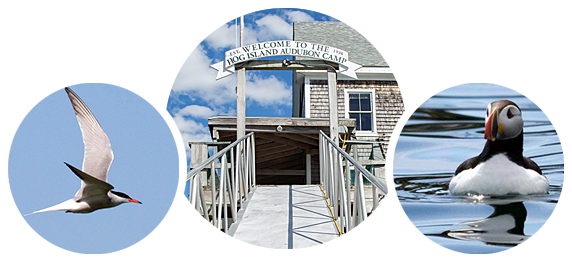By Steve Cartwright — The Working Waterfront — 12/29/2010
A group of volunteers has headed off — at least for now — a deal to transfer ownership of Hog Island in Muscongus Bay from the National Audubon Society to Camp Kieve in Nobleboro.
Three-hundred-acre Hog Island, long a Maine study center for serious birders, has been losing money for years and is on the brink of having new owners. But a dedicated group of birders called Friends of Hog Island hopes to raise enough money to keep it in Audubon hands.
A deal seemed imminent until the Friends of Hog Island intervened. Juanita Roushdy of Bremen, Maine, president of the Friends group, traveled to New York City and met for 90 minutes with the new head of National Audubon, David Yarnold, and also met with Ted Koffman, new chief at Maine Audubon.
“I was thrilled,” said Roushdy. “We’re going to develop a business plan, a viable business over the long term.” Roushdy pointed out both state and national societies have new leaders. “I just think things are different now. What we’re interested in is where are we going from here. If we can raise a substantial amount of money in six months, that’s what I’m hoping for.”
She and others have been stuffing envelopes for a mailing to more than 2,000 potential supporters of Hog Island.

For 75 years, the wooded island has operated as a residential center for education. It has hosted the likes of naturalist Rachel Carson and ornithologist Roger Tory Peterson. Kieve, on nearby Damariscotta Lake, has been run by the same family for 85 years and operates year-round leadership and team-building programs.
Hog Island, valued at $5 million, includes a dock, dining and kitchen area, lecture hall and dormitory, as well as a rocky shore, mossy paths and sandy beaches. It lies within the town of Bremen and is exempt from local taxes. When one-time owner Millicent Bingham gave the island to National Audubon in 1936, she stipulated that it was “to be used solely as a wildlife sanctuary in teaching the aims and ideals of the (society) in the study of conservation and wildlife, and not for any business or commercial purpose.”

